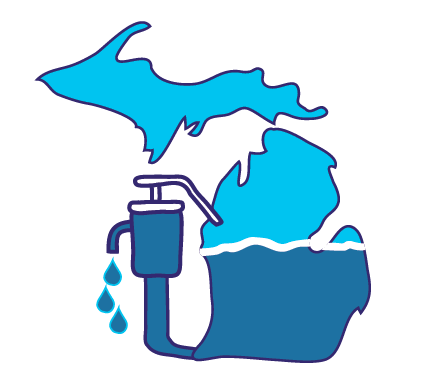The Campaign for Fresh Water in Michigan
Story of Stuff partner FLOW has announced model legislation to protect Michigan’s public waters from unauthorized privatization.
Earlier this year, we released A Tale of Two Cities, a short documentary telling the story of Michigan’s battle for the public control of water. We explored the threat of privatization through the eyes of local activists in Flint, facing an ongoing water crisis, and Evart, where Nestlé dewaters streams for bottling. Now, our Michigan partners at FLOW have drafted new legislation designed to protect public water, a comprehensive and solutions-based response to the current water crises in Michigan.
In the coming months, we will be working together to garner support for this legislation and our joint mission: public access to clean, safe, affordable water for all. Mounting threats to the quality and quantity of our waters, and the issues of social justice surrounding both, have reached a level of incredible urgency. We recognize that such urgency calls for organized, all-encompassing and grand scale action. In response, FLOW has been hard at work identifying key threats, the science and law governing each, and developing the achievable, sustainable action necessary to put an end to the profound water injustice, toxic water quality and water privatization trends we have seen occurring throughout the Great Lakes Region.
The model legislation, Public Water, Public Justice, is part of a larger effort to address the great inequity between bottled water companies like Nestlé and the great suffering of residents in Detroit, Flint, and increasingly beyond as the PFAS-contaminated groundwater crisis threatens drinking water supplies across Michigan.
We are calling on Michigan and the seven other Great Lakes states to pass this model legislation in order to:
- Affirm public ownership over water.
- Protect sensitive water resources.
- Prohibit the sale of water except for authorized bottled water by a licensing and royalty system.
- Recoup for public purposes royalties derived from these bottled water sales. This model law places royalties into a public water, health and justice trust fund to serve people and communities for specific dedicated public purposes, such as replacing lead service lines or creating water affordability plans for disadvantaged people in cities and rural communities.
Jim Olson, FLOW’s founder and president, water rights attorney, and a principal author of the model legislation said, “For over two decades, citizens have witnessed government leaders and elected officials retreat from their paramount constitutional and common law duty to protect public water, health, and the common good above all else. This has resulted in a culture of indifference in which water, people, and health are last, and political agendas and economic interests are first, an indifference that led to the water shutoffs in Detroit, the Flint water crisis, and free sovereign water for a highly profitable bottled water industry, with nothing in return for the needs of the people of Michigan. It is time to right the ship, and restore the public trust and paramount common good on which water governance is founded.”
“My mother, Edna Leak, who passed away just shy of celebrating her 101st birthday was a compassionate water protector,” said Lila Cabbil from the People’s Water Board. “She used to say, ‘You know you can be fined for not giving a dog water, there should be a fine for not giving humans water. It’s not right!’ As her daughter, I too have seen firsthand in Detroit countless times how losing access to water takes a dreadful toll on health and human dignity. This model legislation – Public Water, Public Justice – counters water privatization, protects our water as a commons and human right, and works for water equity and justice. Let the tragedies of Flint and Detroit shape our future so that the people of Michigan never have to worry about access to safe, clean, affordable drinking water.”
“This legislation affirms Michigan’s duty as steward of the Great Lakes for the public trust and its commitment to the people of the state that water is a human right. It is based on the historic principle that water is for the public and cannot be owned or sold. The legislation in this way codifies century-old Supreme Court rulings,” said Noah Hall, Professor of Law, Wayne State University Law School, Founder and Scholarship Director, Great Lakes Environmental Law Center. “And it advances human rights, recognizing that water is our most basic physical need. In this regard the legislation is a step forward where American law has been falling behind, as the human right to water has already been recognized by over 100 other countries. The Great Lakes and the people of Michigan deserve this legislation.”
“Public Water, Public Justice,” is available to the public here and, in addition to the model legislation, includes a two-page bill summary, legal primer, and full report presenting the legal and socio-economic context of water rights and water crises in Michigan.
The work ahead is sure to be challenging and will require fierce commitment, but if these solutions are approached together, our belief in a thriving future for Michigan’s water is unwavering. With your help, change is entirely within reach. We thank you for your support and resilience and look forward to sharing this important work with you as we unite to restore water justice, water quality, and water for all.





